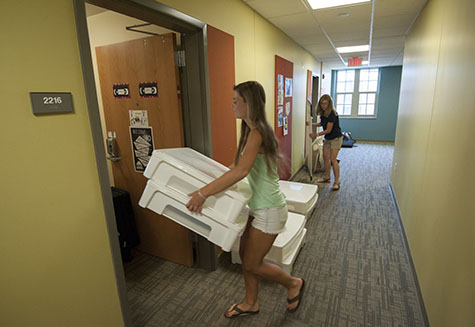
Freshman year of college can be a time of excitement and discovery, but it also is a period of ambivalence, sadness and doubt — and not just for students. Parents also struggle as their child transitions from the bedroom down the hall to the dorm room miles away.
Here, Karen Levin Coburn, senior consultant in residence at Washington University in St. Louis and co-author of the acclaimed book, “Letting Go: A Parents’ Guide to Understanding the College Years,” offers 12 tips – six for now, six for later – that every parent of a new college student should know.

Before your child leaves for college
Be prepared to see less of your child. The closer it gets to departure time, the less you can expect to see of your child. He or she likely will be spending every waking hour with friends. Allow them this special time together.
Recognize your child’s conflicting emotions. Your child, like you, is being pulled between past, present and future. One day, it’s “Leave me alone — I’m 18-years old,” and the next it’s “You’re never around when I need you.” Your child’s ups and downs are a sign of the ambivalence of this transitional time.
Make a financial plan. Develop a tentative budget and be clear about who will pay for what. For example, some parents pay for books and supplies, while their child is responsible for incidental expenses such as snacks, movies and social activities. Other students are responsible for earning a percentage of their tuition. Teach your child about responsible use of credit and debit cards.
Discuss academic goals and expectations. Remember, many first-year students do not do as well academically first semester as they did in high school, and many change their minds about their proposed course of study. Ask them what they hope to explore and accomplish academically during their first year and remember, grades are not the only indication of learning.
Plan your special family celebration before departure. If you accompany your child to campus, don’t expect to have much time together. The college is likely to plan separate activities so students can connect with their classmates from the beginning.
Talk to your child about how you’ll keep in touch. A cell phone can be a wonderful way to keep in touch, or it can be, as one student described it, an “electronic leash.” Talk about Facebook communication and other social media. Set ground rules and expectations together. Some students say it’s OK for their parents to be on Facebook as long as they don’t “like” anything or comment on posts. Others nix the idea entirely.
After your child arrives at college
Be a coach. You’re likely to hear more than your share of problems. When you get those late-night phone calls — and you will — instead of jumping in to solve the problem yourself, encourage your child to use the appropriate campus resources such as the health service or writing center.

Acknowledge that college today is different. Although century-old buildings look untouched by time, college life today is very different from the campus scene 25 or 30 years ago. Think twice before beginning a sentence with, “When I was in college …”
Ask about courses, rather than focusing on grades. Invite your child to share with you the discovery of new ideas, academic interests and intellectual passions.
Don’t tell your child, “These are the best years of your life.” No one is happy all the time between the ages of 18 and 22. When a student is homesick or overtired from studying all night, or a romantic relationship has just fallen apart, it’s not reassuring to have parents imply that this is as good as it gets.
Coburn will be available for interviews after Aug. 1. Contact Diane Toroian Keaggy for assistance.